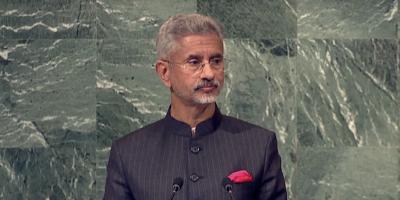
In a significant address to the United Nations, India’s External Affairs Minister, S Jaishankar, underscored the importance of a rule-based approach to counterterrorism, emphasizing that “political convenience” should not dictate responses to terrorism or extremism. The remarks made during the UN General Assembly session were seen as a subtle reference to recent diplomatic tensions, particularly with Canada, and continuing border disputes with Pakistan.
A Call for a Rule-Based Response to Terrorism
Jaishankar urged the global community to adhere to the principles outlined in the UN Charter and the rules-based order when responding to terrorism and extremism. Without naming specific countries, he pointed out the need to refrain from interfering in the internal affairs of sovereign nations. He stated, “…nor must we countenance that political convenience determines responses to terrorism, extremism, and violence. Similarly, respect for territorial integrity and non-interference in internal affairs cannot be exercises in cherry-picking.”
The External Affairs Minister stressed the importance of consistency between words and actions, stating, “When reality departs from the rhetoric, we must have the courage to call it out… without genuine solidarity, there can never be real trust.”
Diplomatic Tensions with Canada
The timing of Jaishankar’s remarks coincided with an ongoing diplomatic dispute between India and Canada. Prime Minister Justin Trudeau’s recent claim of Indian involvement in the killing of Khalistani terrorist Hardeep Singh Nijjar has strained relations between the two nations. India has vehemently denied these allegations and called them “absurd.” The Canadian government has yet to provide evidence supporting its claims.
India has also raised concerns about “politically condoned hate crimes and criminal violence” within Canada, particularly within its influential Sikh community. This issue has become a point of contention in the diplomatic standoff, with India highlighting the need for Canada to address criminal activities originating from its territory.
Tensions with Pakistan
In addition to the Canada row, Jaishankar’s address indirectly addressed ongoing tensions along the India-Pakistan border. India’s response to Pakistan’s raising of the Kashmir issue at the UN General Assembly emphasized the territorial integrity of Jammu and Kashmir as an integral part of India. India reiterated that matters concerning Jammu and Kashmir and Ladakh are internal affairs, and Pakistan has no standing to comment on them.
A Push for India’s Role in the UN Security Council
In a broader context, Jaishankar advocated for India’s permanent seat on the UN Security Council, highlighting India’s role in amplifying the voices of the Global South during the G20 Summit in Delhi and the inclusion of the African Union in this powerful bloc. He called for the Security Council to evolve and become more representative of the contemporary world.
Jaishankar’s UN address underscores India’s commitment to a rule-based international order, while also addressing specific diplomatic challenges and advocating for a more inclusive United Nations.
Sources By Agencies




